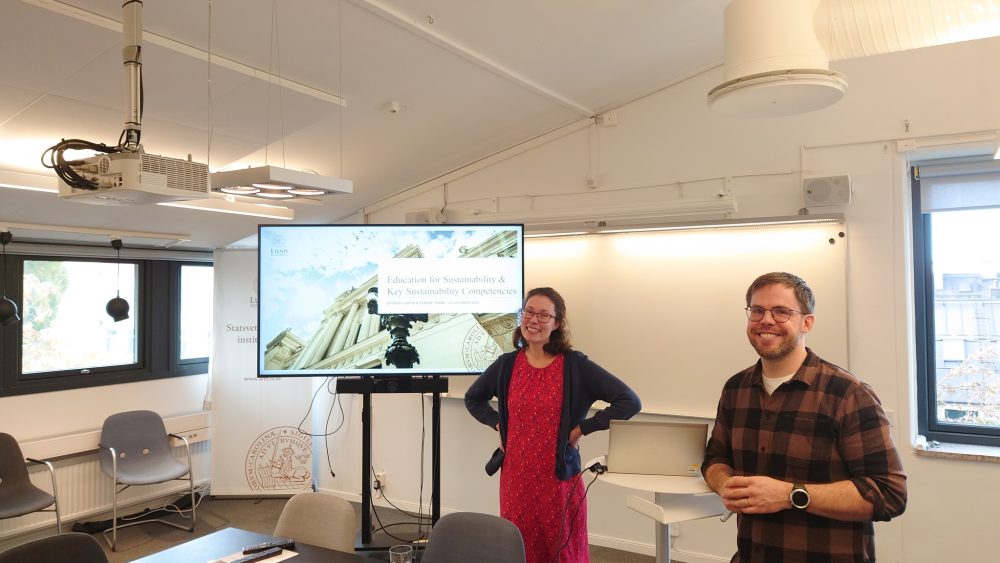As teachers within a large research university, we face challenges considering sustainability in our own teaching practice. This includes both content and our own personal example. How must we prioritise more intentional teaching, when we race from teaching to deadlines to meetings to research?
Perhaps one such way is to ask for support, which is exactly what Jakob Skovgaard of the Department of Political Science did on 22 October 2024. Joined by Terese Thoni – Educational Coordinator at the Sustainability Forum – we prepared a workshop for colleagues at the department, which introduced the sustainability competencies framework as one such approach to integrate sustainability in curriculum. Instead of focusing on sustainability content, this framework emphasises competencies that build on existing curriculum regardless of discipline in order to support students’ abilities to understand, address, and cope with our sustainability challenges.
The participatory workshop engaged those present on topics spanning from student emotional well-being, relevant national and organisational policy, and pedagogical approaches that promote transformative learning. Such approaches advance education for sustainability, which empowers learners with knowledge, skills, values, and attitudes to take informed decisions and make responsible actions for environmental integrity, economic viability, and a just society.
When asked what participants expected to gain from the workshop, they hoped to:
- Exchange ideas and experiences
- Learn how to deal with difficult or uncomfortable topics
- Understand sustainability within their own teaching practice
When dealing with difficult or uncomfortable topics, we suggested creating space for students to navigate emotional effects from their learning. Participants exchanged experiences inviting students to practice breathing exercises to stimulate the parasympathetic nervous system, thus, reducing stress and anxiety. This is an example of embodying emotions, which is part of our efforts to create space, validate, and find actions to address emotional effects from learning.
Those present expressed challenges integrating sustainability for a variety of reasons. To address these challenges, we discussed dealing with complexity, for example, focusing on what you can control (e.g. ambition, approach, timeline); breaking tasks into more manageable chunks; and finding islands of simplicity or behaviours that reflect your values, which may reduce complexity over time.
In reaching more teachers within your department, we suggested harnessing windows of opportunity – those moments where conversations about sustainability can piggyback on existing dialogues. We brainstormed some relevant examples, such as educational quality reviews, course or programme revisions, development talks, pedagogical seminars, or staff retreats.
While we finished the provided content on time, we remained discussing with several engaged participants, demonstrating the passion and excitement evoked by this topic! Terese and I appreciated our time spent at the Department of Political Science. Thanks to Jakob for arranging and all those that were able to attend!
We’re happy to provide similar workshops for your colleagues at Lund University, tailored to your specific needs or requests.
Contact Terese Thoni at the Sustainability Forum – sustainability.lu.se

